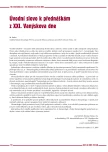Haemotherapy and its safety
Authors:
E. Tesařová; D. Fabiánová; A. Pejchalová; B. Kubešová
Authors‘ workplace:
Transfuzní oddělení a krevní banka FN Brno, pracoviště Bohunice, přednosta prim. MUDr. Eva Tesařová
Published in:
Vnitř Lék 2005; 91(7 a 8): 900-904
Category:
128th Internal Medicine Day - 21rd Vanysek's Day Brno 2005
Overview
Haemotherapy is characterized as applications of blood products and haemoderivates. Traditionally is haemotherapy associated with risks. Their character and importance changed during the history. Only one initially known immunology risk was associated with an incompatible transfusion in AB0 system administered. This immunology risk was detected shortly after discovery of blood groups in 1901. Infectious risks supported haemotherapy from its birth. In the first instance was detected transmission of syphilis of blood. In the seventieth of last century was detected transmission of viruses of blood, hepatitis B respectively. In the eightieth and in the nineties of last century infectious risks of haemotherapy were fortified of virus HIV and others types of hepatitis discovery. Currently are global risks of transfusion oriented to adverse immunology character and possible bacterial contamination of blood products. Authors relate probable risks of transmission of transfusion transmitted diseases to others process and describe occurrence of adverse reactions in relationship to haemotherapy.
Key words:
haemotherapy - safety - transfusion reaction - transfusion transmitted diseases - blood products - haemoderivates
Sources
1. Greenwalt TJ. A short history of transfusion medicine. Transfusion 1977; 37 : 550.
2. Landsteiner K. Uber agglutionationscheinungen normal menschen bluts. Wein Klinische Wochenschrift 1901; 14 : 1132.
3. Klein HG. Transfusion medicine. The evolution of a new discipline. JAMA 1987; 258 : 2108.
4. Committee of experts on Quality Assurance in Blood Transfusion Services. Guide to the preparation, use and quality assurance of blood components. 11th ed. Council of Europe Publishing 2005.
5. Mayer J, Starý J et al. Leukemie. Zásady podpůrné léčby transfuzními přípravky. Praha: Grada 2002 : 188-195.
6. Seghatchian J, Snyder EL, Krailadsiri P. Platelet Therapy. Current status and future trends. Amsterdam: Elsevier 2000.
7. Mitchel KTM, Brecher ME. Approaches to the detection of bacterial contamination in cellular blood products. Transfusion Med Rev 1999; 13 : 132-144.
8. Morrow JF, Braine HG, Kickler TS et al. Septic reactions to platelet transfusion. A persistent problem. JAMA 1991; 166 : 555-558.
9. Barbara JAJ. Transmission of infectious diseases by blood products. European School of Transfusion medicine - Bratislava 2000. Procceding of the ESTM residential course: 21-25.
10. Fehervizyova E. Infekcne rizika transfuzie. XIII. český a slovenský hematologický a transfuziologický kongres s mezinárodní účastí, Praha 2002. Sborník postgraduálních přednášek: 53-62.
11. Hogman CF, Fritz H, Sandberg L. Posttransfusion Serratia marcescens septicemia. Transfusion 1993; 33 : 189-191.
12. Kracíková J. Nežádoucí účinky transfuze v ČR v roce 2003. 10. pracovní dny Společnosti pro transfuzní lékařstaví ČSL JEP. Rožnov pod Radhoštěm 2004. Sborník abstrakt: 44.
13. Jordan JA. Nucleic acid testing for human parvovirus B 19. The Compendium, AABB 53rd annual meeting, 2000, 121-124.
14. Scholle F, Girard YA, Zhao Q. West Nile Virus - infectious properties in vitro and in infected mosquito vectors. Journal of Virology 2004; 78 : 11605-11614.
15. Slavíčková E. CJD - hozená rukavice transfuzní medicíně. Transfuze dnes 1998; 25 : 17-19.
16. Walker RH. Non infectious risk and new trends in transfusion practice. JAMA 1993; 80 : 37-38.
17. Williamson LM. Analysis of first two annual report of SHOT study. BMJ 2000; 3; 316-319.
Labels
Diabetology Endocrinology Internal medicineArticle was published in
Internal Medicine

2005 Issue 7 a 8
-
All articles in this issue
- Retrospectives and perspectives of current haematology
- Primary antithrombotic prevention of venous thrombosis in internal medicine
- Anticoagulant treatment of deep vein thrombosis in ambulatory practice
- Invasive controlled treatment of deep venous thrombosis
- Platelet membrane glycoprotein IIb/IIIa in the view of its genetic changes
- Thrombocytopenic purpuras
- Thrombocytosis and thrombocythemia
- Antithrombotic therapy in the etiology of an acute posthaemorrhagic anaemia
- Anemia of chronic disease
- Autoimmune haemolytic anaemias
- Rare forms of hereditary anaemia in the Czech and Slovak populations - β- and δβ-thalassaemia and unstable haemoglobin variants
- Assuring reliability of blood count examinations
- Phenotype and genotype analysis of hereditary hypofibrinogenaemia and dysfibrinogenaemia
- Antiphospholipid syndrome – diagnosis and treatment
- Thrombophilia
- Antiaggregant therapy
- Platelet membrane glycoproteins from the point of view of their genetic changes
- Platelet membrane glycoproteins from the point of view of their genetic changes
- Haemotherapy and its safety
- Post transfusion reactions
- Refractoriness to platelet transfusion
- Haemovigilance
- Internal Medicine
- Journal archive
- Current issue
- Online only
- About the journal
Most read in this issue
- Post transfusion reactions
- Thrombocytosis and thrombocythemia
- Antiphospholipid syndrome – diagnosis and treatment
- Antiaggregant therapy
